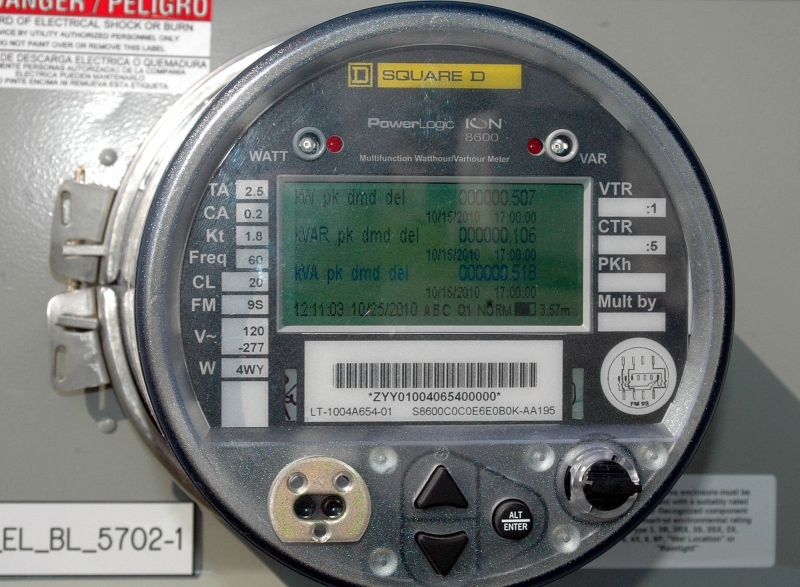Smart meters—small, electronic devices that track and record energy consumption and communicate information back to the electrical utility—can reduce energy use by empowering consumers with the ability to monitor energy use and make better choices. Smart meters are an upgrade to outdated analog meters because they automatically record information in real time instead of requiring someone to manually record and transmit the collected data.
 There are significant advantages to smart meters, both for utility companies and for energy consumers. Smart meters record electricity usage and provide real-time data that can help balance electricity usage while reducing the number of blackouts. They eliminate the need for cumbersome monthly meter readings. Smart meters also can enable dynamic pricing, meaning they can lower or raise the price of electricity in response to demand. In addition to enabling optimization of electricity distribution and reducing power outages and grid failures, smart meters can give consumers better and more detailed reports on energy use, and they can empower consumers to change their energy habits to reduce energy costs.
There are significant advantages to smart meters, both for utility companies and for energy consumers. Smart meters record electricity usage and provide real-time data that can help balance electricity usage while reducing the number of blackouts. They eliminate the need for cumbersome monthly meter readings. Smart meters also can enable dynamic pricing, meaning they can lower or raise the price of electricity in response to demand. In addition to enabling optimization of electricity distribution and reducing power outages and grid failures, smart meters can give consumers better and more detailed reports on energy use, and they can empower consumers to change their energy habits to reduce energy costs.
Smart Meter Programs in the United Kingdom
The UK’s ambitious Smart Meter Programme began in November 2016 with the goal of having a smart meter in every household by the end of 2020. However, according to a recent report by the Centre on Innovation and Energy Demand, there has been a great deal of debate about the technical merits of this program.
For example, electric utilities face costs associated with development and production of equipment as well as training employees to install and maintain the new meters. Additional hurdles include the management of the large quantities of data collected from the meters, ensuring the privacy and security of consumer data, and ensuring that the new smart meters are accurate. Another key challenge is minimizing the environmental impacts of manufacturing smart meters, including waste management and the proper recyling of old meters.
The report provides information and recommendations for managing possible social impacts that have the potential to either promote or disrupt the large-scale smart meter rollout in the UK. Among the key barriers is consumer acceptance: If consumers do not agree to have the new meters installed by their electricity supplier, they do not benefit from the program. Still, they have to contribute toward the cost of the meter rollout through their monthly energy bill.
The report calls for further research to promote a better understanding of potential factors that influence acceptance—or rejection–of smart meter installation. The authors conclude that there is a need for better monitoring—and increased transparency—with regards to the number of consumers who accept the proffered meters, in addition to information on “which arguments proved the most effective for acceptance” and the reasons for non-adoption.
Access to real-time data can incentivize reduced energy consumption and help balance peak demand. This could be further optimized by the adoption of smart appliances.
However, in order to fully take advantage of these possibilities, the report’s authors suggest that a “comprehensive and coordinated policy mix” with measures to promote further action by consumers is key to facilitating the transition to reduced energy use.
Smart Meter Adoption in the United States
According to December 2017 data from the Energy Information Administration (EIA), nearly half of U.S. electricity consumers have smart meters. New meter installations have doubled since 2010. According to the EIA’s Today in Energy report, installation of smart meters varies widely across the United States, with the District of Columbia having the highest rate at 97%, followed by Nevada and Maine. The EIA further explained that these differences are “often driven by state legislation and regulation, as some states require that regulators approve utilities’ cost recovery mechanisms for metering projects.”
Perhaps unsurprisingly, many residential energy consumers don’t even know if they have a smart meter. According to the EIA’s most recent Residential Energy Consumption Survey (2015), 49% of household consumers reported that they did not have a smart meter, while 22% reported that they had a smart meter, and 29% said that they did not know whether they did or not. As we have seen in the UK, where the Smart Meter Programme is arguably more aggressive, more research into the social context regarding the acceptance of smart meters is needed in the United States.
With the patchwork of state and federal regulations and heterogeneity in smart meter policies and adoption in the United States, a national smart meter rollout would arguably have benefits. However, such an approach would have to be carefully coordinated to ensure greatest positive impact. A comprehensive understanding of the different conditions influencing public acceptance, potential environmental impacts, as well as a robust regulatory framework to ensure proper management of waste and recycling of old analog meters are key.
This post first appeared on the Leaders in Energy blog.
